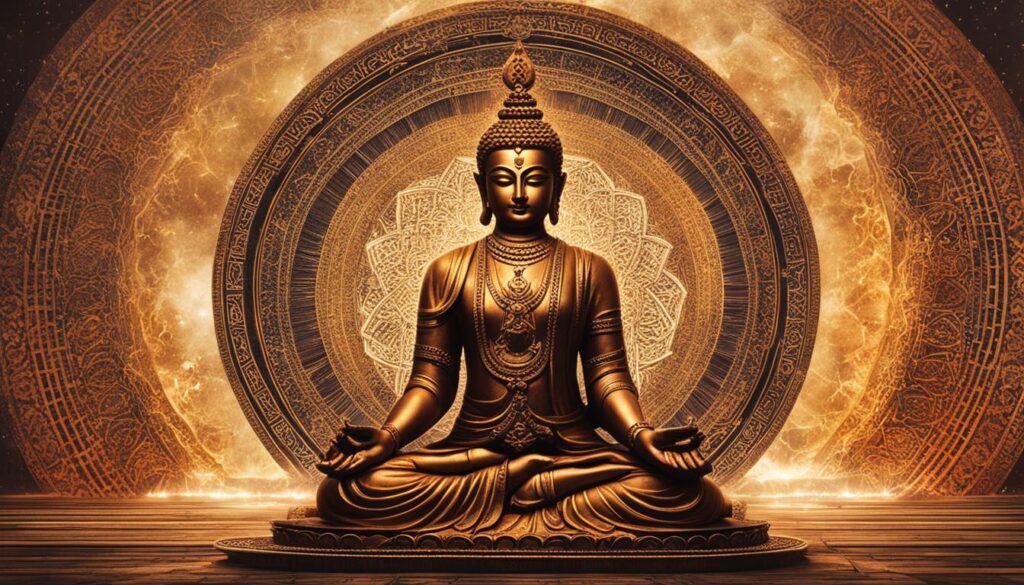In today’s fast-paced and interconnected world, finding balance and harmony in our lives can be a constant struggle. In this case, to know the Brahmacharya meaning is a fructifying decision. It is crucial to find practices that help us navigate the complexities of modern life while fostering personal growth and well-being. One such practice rooted in ancient Hindu philosophy is brahmacharya, which holds deep significance in contemporary life.
Brahmacharya goes beyond its narrow definition of celibacy and encompasses the practice of self-control and virtue in all aspects of life, not just the sexual realm. By embracing Brahmacharya, individuals can experience a profound transformation that leads to balanced living and spiritual growth.
In this article, I will explore the meaning of brahmacharya and share with you seven transformative insights that can help you incorporate its principles into your daily life. Together, we will uncover the power of brahmacharya and how it can contribute to your overall well-being and personal development.
Key Takeaways:
- The Core Brahmacharya meaning is a practice of self-control and virtue in all aspects of life
- It goes beyond celibacy and has profound implications for balanced living
- By embracing the true brahmacharya meaning, you can experience spiritual growth and personal transformation
- In this article, we will explore the meaning of brahmacharya and its relevance in contemporary life
- Learn seven transformative insights that can help you incorporate brahmacharya principles into your daily life
Understanding Brahmacharya Meaning in Contemporary Life
To truly understand brahmacharya meaning in contemporary life, it is important to explore both its historical and cultural significance. In ancient times, brahmacharya was seen as a path to spiritual enlightenment and was practised by spiritual seekers, monks, and nuns. Today, brahmacharya is often misunderstood and associated solely with celibacy, but it encompasses much more. It is a way of life that promotes self-discipline, moderation, and mindful living. This section will delve into the historical roots of brahmacharya and address misconceptions surrounding its meaning.
The Historical and Cultural Significance of Brahmacharya
In Hinduism, brahmacharya has deep historical and cultural significance. It refers to the stage of life when individuals pursue knowledge and spiritual growth, devoting themselves to learning and self-discipline. During this period, which traditionally spanned twelve years, individuals would abstain from worldly desires and focus on spiritual development.
“Brahmacharya is not just about abstaining from sexual activities, but it is a holistic approach to living a disciplined life and channeling one’s energy towards higher purposes,” explains Pandit Ravi Shankar, a renowned Hindu scholar.
By embracing brahmacharya, individuals aimed to purify their thoughts, words, and actions, ultimately leading to a deeper connection with their higher self and the divine. It was viewed as a crucial stepping stone towards realizing one’s true nature and attaining liberation.
Modern Interpretations and Misconceptions
In contemporary times, the concept of brahmacharya has evolved, and its true meaning has been overshadowed by common misconceptions. It is often reduced to celibacy alone, ignoring the broader principles it encompasses. Brahmacharya is not about repression or denial but rather about practicing self-discipline, moderation, and mindfulness in all aspects of life.
The popular belief that brahmacharya is only relevant during youth or practiced for a specific duration is also misguided. Brahmacharya is a lifelong practice that can be embraced by individuals of all ages and walks of life. It offers a path to balance, harmonizing the physical, mental, and spiritual dimensions of existence.
By exploring the historical and cultural significance of brahmacharya and clarifying common misconceptions, we can gain a deeper understanding of this ancient practice and its relevance in contemporary life.
Brahmacharya Meaning in the Lens of Hindu Scriptures
The concept of brahmacharya holds a deep spiritual significance in Hindu scriptures such as the Bhagavad Gita and the Upanishads. These sacred texts provide profound insights into the practice of brahmacharya and its role in attaining Self-realization. In the Bhagavad Gita, Lord Krishna explains the significance of self-restraint in achieving spiritual growth and oneness with the Divine.

“Performing all actions for the sake of the Divine, abandoning attachment and embracing self-control, the wise achieve liberation.”
This verse emphasizes the importance of practicing brahmacharya by performing actions without attachment to the results and cultivating self-control. It is a path towards liberation from the cycle of birth and death.
The Upanishads further explore the depth of brahmacharya and its role in the seeker’s journey towards self-realization. They highlight the practice of restraint and moderation in all aspects of life, including thoughts, speech, and actions. By embracing brahmacharya, one can channel their energy towards spiritual growth and the realization of their true nature.
Yoga, as a spiritual discipline, also incorporates the principles of brahmacharya. Through various yogic practices, individuals learn to cultivate self-control, discipline the mind, and redirect their energy towards higher states of consciousness.
The brahmacharya meaning in yoga aligns with the broader spiritual understanding of the term. It encompasses the practice of sexual continence, but extends beyond it to encompass overall self-discipline, moderation, and mindful living. By embracing brahmacharya in yoga, practitioners can harness their vital energy and direct it towards their spiritual journey.
The Spiritual Aspects of Brahmacharya and Conscious Living
Brahmacharya is a profound spiritual concept that goes beyond mere celibacy. While celibacy is often associated with brahmacharya, its spiritual aspects encompass much more. This practice involves self-control, moderation, and mindful living in all aspects of life. By embracing brahmacharya, individuals can experience a transformative journey towards spiritual awakening and self-realization.
Celibacy as a Path to Spiritual Awakening
Celibacy plays a significant role in the practice of brahmacharya. By abstaining from sexual activity, individuals can conserve vital energy and redirect it towards spiritual growth. Celibacy is seen as a powerful tool for transcending physical desires and emotions, enabling seekers to attain higher levels of consciousness. It allows individuals to focus their energy on self-discovery, meditation, and the pursuit of spiritual knowledge.
Non-Sexual Interpretations of Brahmacharya
While celibacy is integral to brahmacharya, it is important to note that there are non-sexual interpretations of this practice. It encompasses self-control, which extends beyond sexual desires and includes moderation in all aspects of life. Practicing brahmacharya involves disciplining the mind, emotions, and senses, leading to a balanced and harmonious existence.
By embracing the principles of brahmacharya, individuals can cultivate self-discipline and lead a conscious life. This practice fosters a sense of inner peace, emotional stability, and clarity of mind. It enables individuals to make mindful choices, practice moderation, and develop a profound understanding of themselves and the world around them.
| Benefits of Celibacy and Brahmacharya | Spiritual Aspects of Brahmacharya | Self-Control and Discipline |
|---|---|---|
| 1. Conservation of vital energy | 1. Path to spiritual awakening | 1. Mindful living in all aspects |
| 2. Increased focus and clarity | 2. Transcendence of physical desires | 2. Discipline of the mind, emotions, and senses |
| 3. Heightened spiritual awareness | 3. Inner peace and emotional stability | 3. Making conscious choices |
| 4. Enhanced self-realization | 4. Harmonious existence | 4. Deep understanding of oneself and the world |
Integrating Brahmacharya into Daily Life for Improved Well-being
Integrating the principles of brahmacharya into daily life can have a profound impact on our overall well-being and inner balance. It’s not just a practice confined to religious or spiritual realms; it is relevant to individuals seeking personal growth and a more purposeful life. By incorporating the essence of brahmacharya into our daily routines, we can cultivate a sense of self-control, discipline, and mindfulness that brings us closer to a state of harmony.
Mindfulness and Self-Discipline Techniques
Brahmacharya encourages us to practice mindfulness and self-discipline in every aspect of our lives. This involves being fully present in the moment and consciously making choices that align with our higher values and principles. Mindfulness techniques such as meditation, conscious breathing, and body awareness can help us develop a deeper connection with ourselves and cultivate a greater sense of self-control.
Self-discipline is a fundamental aspect of brahmacharya. It requires us to exert restraint over our physical and mental desires, paving the way for greater self-mastery. By cultivating self-discipline, we can overcome the distractions and temptations that hinder our spiritual growth and well-being.
Here are some self-discipline techniques that can help us integrate brahmacharya into our daily lives:
- Creating and following a daily routine that promotes balance and self-care
- Setting clear goals and priorities that align with our values and long-term vision
- Practising moderation in all aspects of life, including diet, consumption, and leisure activities
- Cultivating healthy habits, such as regular exercise, adequate rest, and nurturing relationships
- Avoiding excessive indulgence in sensory pleasures and mindless distractions
Bridging Physical Restraints with Mental Fortitude
The practice of brahmacharya goes beyond external restraints. It requires us to cultivate mental fortitude and inner strength to stay committed to our chosen path. By bridging physical restraints with mental discipline, we can navigate the challenges and temptations that may arise along the way.
This integration involves:
- Developing resilience and willpower to resist impulsive desires or behaviours
- Fostering a positive mindset and cultivating gratitude for the abundance in our lives
- Embracing challenges as opportunities for growth and learning
- Finding healthy ways to channel our energy and creativity
- Seeking support from like-minded individuals or communities
By combining physical restraints with mental fortitude, we can authentically practice brahmacharya and experience its transformative effects on our well-being.
What Does Brahmacharya Mean to Your Personal Growth
Brahmacharya has a profound impact on personal growth and development. By cultivating self-control and embracing the principles of brahmacharya, individuals can harness their energy and direct it towards creative and productive outlets.
Self-Control and Its Role in Personal Advancement
Self-control is a key element of brahmacharya, as it allows individuals to govern their thoughts, actions, and emotions. By practising self-control, one can develop discipline, focus, and resilience, which are essential for personal advancement. It enables individuals to overcome challenges, make conscious choices, and stay committed to their goals.
Channeling Energy Towards Creative and Productive Outlets
One of the fundamental aspects of brahmacharya is redirecting energy towards creative and productive pursuits. When individuals exercise self-control and abstain from impulsive behaviours, they can channel their energy into activities that enrich their lives and contribute to their personal growth. This can include pursuing artistic endeavours, engaging in intellectual pursuits, or devoting oneself to meaningful work.
“The mind alone is the world, the energy alone is the power of the world; put the mind on Brahmacharya and you can conquer the whole world.”

The ability to channel one’s energy in a focused manner not only enhances personal growth but also cultivates a sense of purpose and accomplishment. By engaging in activities that align with one’s passions and values, individuals can experience a deep sense of fulfilment and contribute positively to the world around them.
Practical Benefits of Celibacy and Mindful Living
The practice of celibacy and mindful living, central aspects of brahmacharya, offer numerous practical benefits. By conserving vital energy and practising self-control, individuals may experience increased focus, clarity, and productivity. Celibacy can also foster a deeper understanding of oneself and others, improve relationships, and contribute to overall physical and mental well-being.
When individuals practice celibacy, they redirect their energy away from sexual desires and towards their goals and aspirations. This heightened focus allows them to dedicate their time and efforts to personal growth, professional development, and spiritual practices. Through celibacy, individuals can cultivate self-discipline and gain mastery over their impulses, leading to increased willpower and the ability to achieve long-term goals.
Mindful living, another key aspect of brahmacharya, involves being fully present in each moment and consciously making choices that align with one’s values. This practice allows individuals to develop a deep sense of self-awareness and emotional intelligence, enhancing their interpersonal relationships and overall well-being. By embracing mindfulness, individuals can cultivate compassion, empathy, and gratitude, leading to more fulfilling connections with others.
The benefits of celibacy and mindful living extend beyond the individual, positively impacting society as a whole. By practising self-control and moderation, individuals contribute to a harmonious and balanced community. Additionally, the enhanced focus, clarity, and productivity gained through celibacy and mindful living can lead to achievements that benefit not only the individual but also society at large.
Overall, the practical benefits of celibacy and mindful living make Brahmacharya a transformative practice that can positively impact all aspects of daily life. By conserving vital energy, practising self-control, and embracing mindful living, individuals can experience increased focus, improved relationships, and a greater sense of well-being.

| Practical Benefits of Celibacy and Mindful Living | |
|---|---|
| Increased focus, clarity, and productivity | Celibacy allows individuals to redirect their energy towards their goals and aspirations, leading to heightened focus and increased productivity. |
| Improved self-discipline and willpower | Celibacy cultivates self-control and mastery over impulses, leading to enhanced willpower and the ability to achieve long-term goals. |
| Deeper understanding of oneself and others | Celibacy fosters introspection and self-awareness, promoting a deeper understanding of one’s desires, emotions, and motivations. This understanding also extends to others, leading to improved relationships. |
| Enhanced interpersonal relationships | Mindful living cultivates emotional intelligence and empathy, leading to improved communication, conflict resolution, and overall interpersonal relationships. |
| Contribution to society | Practising self-control and moderation contributes to a harmonious and balanced community, while the increased focus and productivity gained through celibacy and mindful living can lead to achievements that benefit society at large. |
| Overall well-being | By conserving vital energy, practising self-control, and embracing mindful living, individuals can experience a greater sense of well-being, both physically and mentally. |
Brahmacharya by Swami Vivekananda and Its Relevance Today
Swami Vivekananda, a renowned spiritual leader, emphasized the importance of brahmacharya in his teachings. He highlighted its role in personal and spiritual growth, as well as its relevance in addressing modern challenges. Swami Vivekananda’s profound insights on brahmacharya guide individuals seeking to navigate the complexities of contemporary life.
Swami Vivekananda’s Teachings on Brahmacharya
Swami Vivekananda regarded brahmacharya as a powerful practice that fosters self-discipline, mental clarity, and inner strength. He recognized that by channelling our energy and directing it towards higher pursuits, we can unlock our true potential and experience spiritual awakening. Vivekananda stressed the need for individuals to establish control over their senses and cultivate a balanced, focused mind through the practice of brahmacharya.
Applying Ancient Wisdom to Modern Challenges
Vivekananda believed that the principles of Brahmacharya could be applied to overcome the challenges of modern life. In an era marked by distractions and constant stimulation, he advocated for self-control and mindful living as essential tools for navigating the complexities of contemporary society. By embracing the ancient wisdom of Brahmacharya, individuals can find balance amidst the demands of the modern world and achieve greater clarity, purpose, and fulfilment.
Brahmacharya in Yoga and Meditative Practices
How Brahmacharya Enhances Yogic Experience
Brahmacharya, a fundamental concept in the practice of yoga, plays a significant role in enhancing the yogic experience. By embracing the principles of brahmacharya, individuals can deepen their connection with their inner selves and cultivate a greater sense of mindfulness and self-discipline.
Yoga is not just a physical exercise; it is a spiritual and transformative practice that aims to unite the mind, body, and spirit. Brahmacharya enables practitioners to shift from the physical aspects of yoga to the spiritual dimensions, allowing for a more profound exploration of the self.
While engaging in yoga postures (asanas) and breathing techniques (pranayama), practitioners who observe brahmacharya can harness their energy and direct it towards their spiritual growth. By practising self-control and abstaining from excessive sensory indulgence, individuals can conserve vital energy and channel it towards their inner journey.
The integration of brahmacharya in yogic practices promotes focused concentration and heightened awareness. By cultivating inner balance and harmony, practitioners can experience a deeper connection with their body, mind, and spirit. It allows them to fully immerse themselves in the present moment and gain a profound understanding of yoga’s transformative power.
The Transition from Physical to Spiritual through Brahmacharya
As individuals progress in their yoga practice, they may find themselves experiencing a shift from the physical aspects to the spiritual dimensions of yoga. This transition is supported by the practice of brahmacharya, which acts as a bridge in the journey towards self-realization.
Through brahmacharya, practitioners develop the ability to detach from external distractions and cultivate a deeper awareness of their inner world. They learn to navigate their thoughts, emotions, and desires with equanimity, allowing them to tap into their higher consciousness and explore the spiritual aspects of their being.
Brahmacharya involves not just sexual abstinence but also the moderation of external sensory inputs and the cultivation of mental purity. By practising self-discipline and restraining from excessive indulgence, practitioners can purify their minds and create a conducive environment for spiritual growth.
This transition from the physical to the spiritual is a gradual process that requires dedication and mindfulness. Brahmacharya acts as a guiding principle, supporting individuals in their journey towards self-transcendence and the realization of their true nature.
In conclusion, the integration of brahmacharya in yoga and meditative practices enhances the yogic experience and facilitates the transition from the physical to the spiritual. By embracing these principles, practitioners can deepen their connection with their inner selves, cultivate mindfulness, and embark on a transformative journey of self-realization.
Conclusion
In conclusion, brahmacharya holds immense potential for transformative impacts on both balanced living and spiritual growth. By gaining a clear understanding of its meaning and embracing its principles, individuals can embark on a journey towards profound personal development and enhanced well-being. Brahmacharya is not merely a concept to be understood intellectually, but a way of life to be integrated into our daily routines.
By practising self-control and mindfulness, we can tap into the immense power that brahmacharya offers. It enables us to channel our energy towards meaningful pursuits and cultivates a sense of inner harmony and discipline. This practice is not limited to a single aspect of life; rather, it permeates every facet, leading to holistic growth and self-realization.
Taking the Next Steps towards Balanced Living
So, how can we take the next steps on the path of Brahmacharya and move towards a more balanced and fulfilling life? It begins with a commitment to self-discipline and a willingness to embrace change. By consciously aligning our actions with the principles of Brahmacharya, we can gradually transform our habits and attitudes, leading to positive outcomes.
Start by incorporating small changes into your daily routine. Practice moderation in all aspects of life – from food and entertainment to work and social interactions. Cultivate mindfulness and self-awareness, observing the impact of your choices on your well-being. Surround yourself with supportive individuals who share similar aspirations for personal growth.
Remember, the path of Brahmacharya is not an overnight transformation, but a continuous journey. Embrace the lessons learned, celebrate the progress made, and remain committed to the principles that underpin this ancient practice. Doing so will pave the way for a life of balance, fulfilment, and spiritual growth.
FAQ
What is the meaning of brahmacharya?
Brahmacharya is a Sanskrit term that refers to the practice of self-control and purity, not just in a sexual context, but in all aspects of life. It is rooted in ancient Hindu philosophy and promotes self-discipline, moderation, and mindful living.
What are the benefits of practising Brahmacharya?
The practice of brahmacharya offers numerous benefits, including improved focus, clarity, and productivity. It can foster self-realization, enhance relationships, and contribute to overall physical and mental well-being.
How can one integrate the principles of Brahmacharya into daily life?
To incorporate brahmacharya into daily life, individuals can cultivate mindfulness and self-discipline techniques. It is important to bridge physical restraints with mental fortitude, as the practice of brahmacharya extends beyond external actions.
Does Brahmacharya only involve celibacy?
No, celibacy is just one aspect of Brahmacharya. While celibacy is seen as a powerful tool for conserving vital energy, brahmacharya also emphasizes self-control, moderation, and mindful living in all areas of life.
What did Swami Vivekananda teach about brahmacharya?
Swami Vivekananda emphasized the importance of brahmacharya in personal and spiritual growth. He highlighted its role in addressing modern challenges and its relevance in navigating the complexities of contemporary life.
How does Brahmacharya relate to yoga and meditation?
Brahmacharya plays a significant role in yogic and meditative practices. By embracing the principles of brahmacharya, individuals can enhance their experience, deepen their connection with their inner selves, and journey towards self-realization.
What are the main rules of brahmacharya?
The main rules of Brahmacharya include practising self-control, moderation, and mindful living in all aspects of life. It also involves cultivating celibacy, conserving vital energy, and redirecting it towards spiritual growth and self-realization.
Source Links
- https://stason.org/TULARC/sex-relationships/sex-celibacy/1-What-kind-of-people-are-celibate.html
- https://selfdefinition.org/celibacy/gopal-krishna-collection/quotes-from-spiritual-scriptures.htm
- https://stason.org/TULARC/sex-relationships/sex-celibacy/6-What-are-the-advantages-of-celibacy.html




